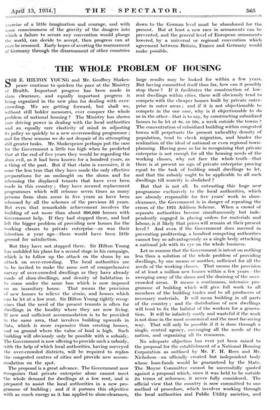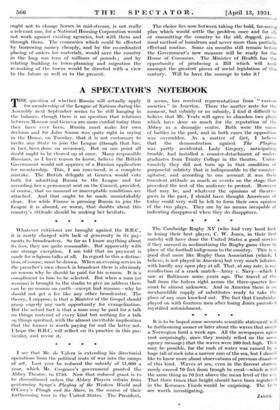THE WHOLE PROBLEM OF HOUSING S IR E. HILTON YOUNG and
Mr. Geoffrey Shakes- peare continue to quicken the pace at the Ministry of Health. Important progress has been made in slum clearance, and equally important progress is being organized in the new plan for dealing with over- crowding. We are getting forward, but shall we, without still bolder measures, ever conquer the whole problem of national housing ? The Ministry has shown rare driving power in dealing with the local authorities and an equally rare elasticity of mind in adjusting its policy so quickly to a new overcrowding programme ; and for these reasons we do not despair of its attempting still greater tasks. Mr. Shakespeare perhaps put the case for the Government a little too high when he predicted that at the end of five.years they would be regarding the slum evil, as it had been known for 'a hundred years, as a thing of the past. But if that claim is excessive, it is none the less true that they have made the only effective preparations for an onslaught on the slums and for rehousing the displaced tenants that have ever been made in this country ; they have secured replacement programmes which will rehouse seven times as many persons from slum areas in five years as have been rehoused by all the schemes of the previous 55 years. But even that remarkable achievement involves the building of not more than about 300,000 houses with Government help. If they had stopped there, and had left the bigger problem of providing new houses for the working classes to private enterprise—as was their intention a year ago—there would have been little ground for satisfaction.
But they have not stopped there. Sir Hilton Young has unfolded his plans for a second stage in his campaign, which is to follow up the attack on the slums by an attack on over-crowding. The local authorities are to be invited to make the same sort of comprehensive survey of over-crowded dwellings as they have already made of slum-dwellings, and density of habitation is to come under the same ban which is now imposed on an insanitary house. That means the provision of new houses to relieve the strain, and houses which can be let at a low rent. Sir Hilton Young rightly recog- nizes that the need of the present tenants is often for dwellings in the locality where they are now living. If new and sufficient accommodation is to be provided in the smile area, that involves building upwards in fiats, which is more expensive than erecting houses, and on ground where the value of land is high. Such building will obviously only be possible with a subsidy. The Government is now offering to provide such a subsidy, with the help of which local authorities, having surveyed. the over-crowded districts, will be required to replan the congested centres of cities and provide new accom- modation on the spot.
The proposal is a great advance. The Government now recognizes that private enterprise alone cannot meet the whole demand for dwellings at a low rent, and is prepared • to- assist the local authorities in a new pro- gramme of building ; and if it pursues this objective with as much energy as it has applied to slum-clearance, large results may be looked for within a few years. But having committed itself thus far, how can it possibly stop there ? If it facilitates the construction of low- rent dwellings within cities, these will obviously tend to compete with the cheaper houses built by private enter- prise in outer areas ; and if it is not objectionable to compete in the one case, why is it objectionable to do so in the other—that is to say, by constructing subsidized houses to be let at 8s. or 10s. a week outside the towns ?
The concentration of subsidized building within congested towns will perpetuate the present unhealthy density of population, tend to check migration, and hinder the realization of the ideal of national or even regional town- planning. Having gone so far in recognizing that private enterprise is not enough for all the housing needs of the working classes, why not face the whole truth—that there is at present no sign of private enterprise proving equal to the task of building small dwellings to let, and that the subsidy ought to be applicable to all such dwellings till scarcity is abolished ?
But that is not all. In entrusting this huge new programme exclusively to the local authorities, which are already responsible for five years' work in slum- clearance, the Government is in danger of repeating the errors of the 1921 Addison Scheme. When a crowd of separate authorities become simultaneously but inde- pendently engaged in placing orders for materials and labour, is it likely that prices will remain at their present level ? And even if the Government does succeed in preventing profiteering, a hundred competing authorities cannot buy so advantageously as a single body attacking a national job with its eye on the whole business.
Let us assume that the Government is intent on nothing less than a solution of the whole problem of providing dwellings, by one means or another, sufficient for all the needs of the working classes. That means the provision of at least a million new houses within a few years—the sweeping away of the slums and the draining of the over- crowded areas. It means a continuous, intensive pro- gramme of building which will give full work to all members of the building trades and to all producers of necessary materials. It will mean building in all parts of the country ; and the distribution of new dwellings will tend to fix the habitat of the workers for a genera- tion. It will be infinitely costly and wasteful if the work is not done in the most economical and the most far-seeing way. That will only be possible if it is done through a single, central agency, envisaging all the needs of the nation, and organizing all its resources.
No adequate objection has ever yet been raised to the proposal for the establishment of a National Housing Corporation as outlined by Mr. F. H. Rees and Mr. Nicholson—an officially created but independent body whose loan-funds would be guaranteed by the State. The Moyne Committee cannot be successfully quoted against a proposal which, since it was held to be outside its terms of reference, it never fully considered. The official view that the country is now committed to one method of procedure, which involves working through the local authorities and Public Utility societies, and ought not to change horses in mid-stream, is not really a relevant one, for a National Housing Corporation would not work against existing agencies, but with them and through them. The economies which could be effected by borrowing money cheaply, and by the co-ordinated placing of orders for materials, would save the country in the long run tens of millions of pounds ; and by relating building to town-planning and migration the re-making of the towns would be directed with a view to the future as well as to the present. The choice lies now between taking the bold, far-seeing plan which would settle the problem once and for all, or committing the Country to the old, dogged, piece- meal method of humdrum and never more than partially effectual routine. Some six months still remain before -the Government's new measure will be ready for the House of Commons. The Minister of Health has the opportunity of producing a Bill which will rank amongst the greatest pieces of social legislation of this century: Will he have the 'courage to take it?

















































 Previous page
Previous page